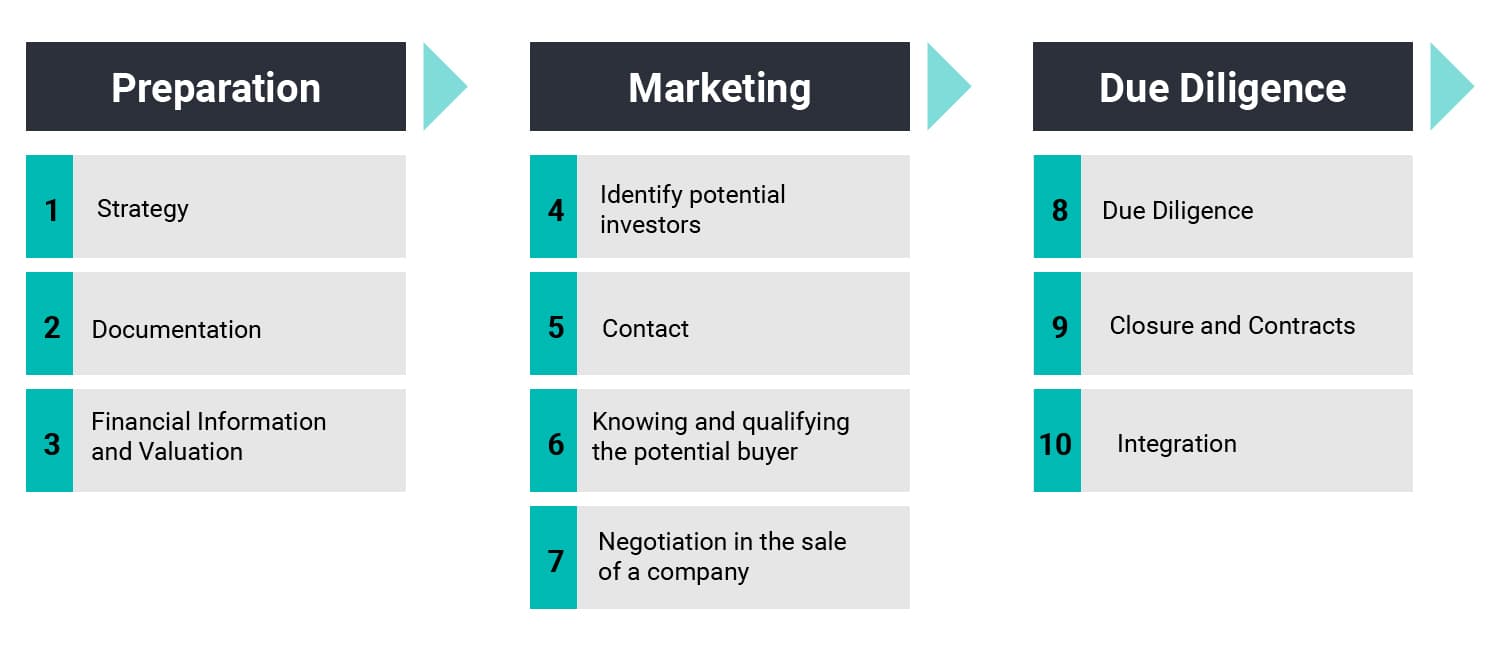
Sale of companies
Are you considering selling your company?
What you need is a global and multidisciplinary process to find a buyer that guarantees you the best conditions. In this type of process it is not only a question of maximising the price in the sale of companies, as there are a multitude of equally important variables that must be managed and negotiated:
- Payment terms
- Minimum taxes
- Non-competition agreements
- Senior management contracts
- Reduction of risks and liabilities
- Integration plan that addresses the future of employees after the sale of your company
Issues of concern about the sale of your business
- What is the maximum valuation of my business and how can I get it?
- Is it the right time to sell my company with guarantees of success?
- What are the options available to shareholders to meet our objectives?
- How can I present my company as attractively as possible to investors?
- Which investors are most able to pay and have the greatest interest in my company?
- How can I reduce the risks of initiating a company sale process such as leaks or over-commitment?
- What other terms should I negotiate in addition to price, will I have to take on liabilities, and how can I reduce them?
10 steps in the process of selling a business
All transactions are different and unique. To offer you the best experience, we involve a team of people with different and complementary skills (analysis of competitive environments, search for potential buyers, financial analysis, communication, etc.), all led by an experienced Dealmaker.

Our team follows the solid and supported 10-step process:
Preparation
1. Strategy
The success of any process is a good preparation beforehand, which will result in a better valuation and a reduction of the duration of the process. For this, it is necessary to be clear: Why do I want to sell my company? What is the target price? Who should be involved in the process?
2. Documentation
Be prepared for any questions from the potential buyer. Some common questions: What are my differentiators? Who is the key team? Who are the main competitors? Why do my customers buy from me? How do I maintain and grow my competitive advantage?
3. Financial Reporting and Valuation
Consistent financial information reflects professionalism and builds buyer confidence. What is the expected growth of my company? Do I have the financial information prepared? How do I argue the assumptions of the business plan to the buyer? Am I prepared to provide the information required by the investor in the DD (VDR)?
Therefore, it is important to assess and analyse the projections, as the price is often partly linked to them.
Marketing
4. Identify potential investors
This consists of identifying the type of investor who may be interested in your company. What type of investors are there? Which one is the most suitable for my company? Which one can pay the best price? What is their decision-making process like?
5. Contact
The objective in this phase is to contact the decision-maker and generate interest with a personalised and attractive message. Who do I contact? What type of communication should I use? How is confidentiality protected?
6. Knowing and qualifying the potential buyer
The efficiency of the process depends mainly on negotiating with those investors who are really interested in the acquisition. Are they really interested in my company? Do they have the fit I am looking for? What kind of investment capacity do they have? What kind of deal structure do they usually use?
7. Negotiating the sale of a company
The secret is in the details. Which of the candidates to negotiate with? Who should make the first offer? Who controls and drafts the LOI? This is the most important and complex phase, the process is at stake in every detail.
Due Diligence and Closing
8. Due Diligence
At this point many deals fall through. What topics should the DD cover? Should I provide all the information they ask for? How does a Dataroom work? What implications does it have on the final deal? A good preparation from the beginning of the process avoids last minute surprises.
9. Closing and Contracts
The structure of the deal is even more important than the price itself. In this phase, the critical aspects of the transaction are defined in detail. How and when is the agreed price paid? What guarantees does the seller provide to the buyer? Is part of the price retained?
10. Integration
In the sale of companies, this is the final stage of the process and includes, among other things, the drafting of a plan for the first 100 days, the calculation of the synergies achieved and the assignment of a team to be in charge of the integration.
If you would like to know how we can help you sell your business, either in the short or long term, please contact our specialised team.

